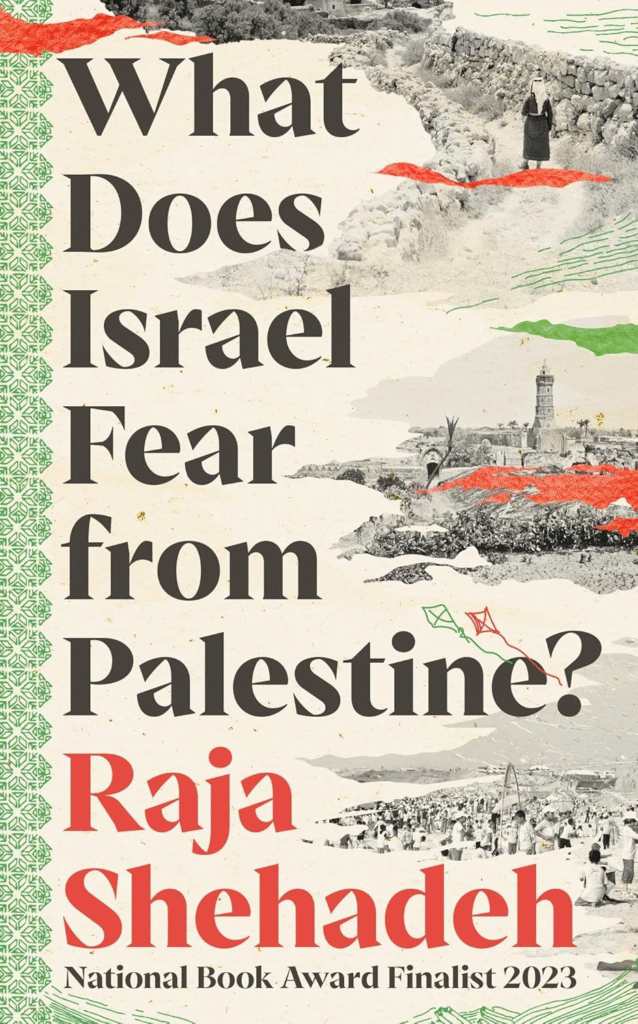What Does Israel Fear from Palestine? by Raja Shehadeh is a bold and thoughtful book that delves into the roots of the Israel-Palestine conflict from a Palestinian perspective. Published in June 2024, the book reflects on key moments in history from the 1948 Nakba and the 1967 Six-Day War to the Oslo Accords and the 2023 Gaza War highlighting how each could have been a turning point toward peace, yet repeatedly ended in deeper division. A respected human rights lawyer and writer, Shehadeh brings both clarity and compassion to his account, laying bare the realities of occupation, the suffering of civilians, and the fear that seems to drive Israeli policy.

What sets this book apart is its refusal to resort to extremes. Instead, it invites readers to look deeper into how narratives have been shaped over decades and how they continue to fuel mistrust and violence. One important issue the book quietly points out is how people often leave out key parts of important documents like the Balfour Declaration when discussing this conflict. While often referenced to justify the early support for a Jewish homeland, the full text includes a critical clause that is frequently left out: that “nothing shall be done which may prejudice the civil and religious rights of existing non-Jewish communities in Palestine.” The fact that this key condition has largely been ignored in historical practice is not lost on Shehadeh or on critical readers. It is a reminder that the story is far more complex than the dominant narrative suggests.
In just 96 pages, What Does Israel Fear from Palestine? presents a compelling overview of a conflict where fear, propaganda, and historical grievances often silence moderate voices. Shehadeh’s writing is calm but piercing, offering hope by insisting that understanding and empathy are still possible even now. For readers seeking a fair, deeply personal, and thought-provoking reflection on this crisis, this book is essential reading. It challenges the myths, brings attention to uncomfortable truths, and calls for a future where coexistence is not just a dream, but a shared goal built on dignity and justice for all.
Read Also: Shooting Straight: Life of Lt Gen Nanavatty
Availability & Book Details
Raja Shehadeh’s What Does Israel Fear from Palestine? published on 6th June 2024 is a concise but powerful 96-page exploration of the Israeli‑Palestinian conflict. Reviewers consistently praise the book’s clarity, emotional honesty, and sharp legal‑political insight and highlighting its ability to challenge dominant narratives, expose forgotten truths like the Nakba, and still end on a hopeful note calling for coexistence. The authority of Shehadeh’s voice rooted in his work as a lawyer and human rights activist and makes this a standout read. In India, the Kindle edition is affordably priced at ₹175, the paperback at ₹184, and the audio version is available for free. That means whether you prefer reading or listening, there is a convenient option to engage with this essential and timely reflection on one of the world’s most entrenched conflicts. You can buy the book on Amazon, Flipkart, Kindle, Audible, and other major online platforms.
About the Author: Raja Shehadeh
Raja Shehadeh is a well-known Palestinian writer, lawyer, and human rights activist. Born in 1951 in Ramallah, he studied literature in Beirut and law in London. In 1979, he co-founded Al-Haq, one of the first independent Palestinian human rights organizations, which works to document and challenge violations under Israeli occupation.
Shehadeh is the author of several critically praised books, including Strangers in the House, Occupation Diaries, and Palestinian Walks, which won the Orwell Prize for Political Writing in 2008. His works blend personal reflection with legal and political commentary, offering deep insights into Palestinian life under occupation.
His recent memoir, We Could Have Been Friends, My Father and I, was a finalist for major literary awards, including the National Book Award and the Los Angeles Times Book Prize in 2023. He was also named an International Writer by the Royal Society of Literature in 2022.
Shehadeh’s writings highlight themes of justice, displacement, and the struggle for peace. Through both his legal work and storytelling, he continues to be one of the strongest voices for Palestinian rights and history. He lives in Ramallah with his wife, writer and researcher Penny Johnson.
Read Also: The Battle of Haji Pir by Kulpreet Yadav
Themes in What Does Israel Fear from Palestine?
- The Legacy of Occupation and Historical Injustice: In What Does Israel Fear from Palestine?, Raja Shehadeh traces the deep historical roots of the conflict, starting from the Balfour Declaration of 1917 to the Nakba of 1948 and beyond. He critically examines Israel’s refusal to acknowledge Palestinian displacement, portraying it not just as political erasure but also as cultural and historical. Towns and villages were renamed, and Palestinian refugees denied return, while Israel constructed a founding narrative grounded in biblical promises and wartime necessity. While critics of the book point out Shehadeh’s narrow framing and lack of nuance especially around Jewish historical claims or Palestinian leadership failures and his central theme remains the existential denial of Palestinian identity and rights.
- Gaza as the Moral and Political Flashpoint: The second part of What Does Israel Fear from Palestine? focuses on the Gaza War of 2023–24. Shehadeh describes Gaza as the epicenter of global attention and suffering. With over 70% of civilian infrastructure destroyed and thousands of deaths, the war becomes a symbol of the wider impasse in the conflict.The author highlights how international outrage, especially from civil society, is beginning to shift the conversation from recognition of Palestinian statehood by over 140 UN member states to ICC investigations. Critics argue that Shehadeh oversimplifies the narrative by framing all Israeli actions as part of a singular oppressive strategy. Still, his focus remains on how Gaza’s devastation could be a catalyst for international accountability.
- Failure of the Peace Process and Internal Responsibility: Shehadeh acknowledges that Palestinians too have failed in many respects. He emphasizes the need to reactivate political structures like the PLO and conduct fair elections. However, some readers find his treatment of the Oslo Accords and Camp David negotiations lacking particularly his omission of Palestinian leadership’s missed opportunities in the 2000 peace talks, where Arafat rejected significant concessions from Israel.The author also highlights divisions within Palestinian society and the tension between groups like Hamas and the PLO. Yet, critics argue that Shehadeh does not fairly assess the consequences of Palestinian extremism and how it has undermined the peace process.
- Selective Narratives and the Struggle for Historical Legitimacy: One of the book’s core tensions is its rejection of Zionism as a legitimate nationalist movement. Shehadeh argues that Israel’s claim to the land is based purely on religious mythology. However, critics point out that Zionism began as a secular, national movement grounded in historical connection to the land and centuries of exile following Roman conquest. The Jewish claim to Israel, they argue, is both historical and cultural not merely religious.While Shehadeh demands recognition of Palestinian suffering, his reluctance to acknowledge Jewish historical ties and Palestinian complicity in past violence makes his narrative feel one-sided to many readers.
- The Role of International Law and Global Opinion: In What Does Israel Fear from Palestine?, Shehadeh gives significant weight to global legal institutions like the International Criminal Court and the International Court of Justice. He sees these as vital tools in ending Israeli impunity and fostering accountability. Recent developments such as the ICJ’s reaffirmation of the illegality of occupation and South Africa’s genocide case against Israel are highlighted as signs of changing tides.Despite this, critics argue that Shehadeh overestimates the legal route and underestimates the need for mutual recognition and compromise. Yet, his central point remains clear: international law must be applied equally if peace is to have a foundation.
- Refugeehood and Intergenerational Memory: One of the most emotionally charged sections of the book What Does Israel Fear from Palestine? involves Shehadeh’s memory of his grandmother, exiled from Jaffa in 1948, who believed the lights on the horizon were her hometown. This memory captures how exile and loss are passed down generations. Refugeehood, for Shehadeh, is not just a status but a living identity, one that must be acknowledged in any future settlement. This deeply personal element adds emotional weight to the book. However, the absence of equal recognition for Jewish trauma and displacement such as during the Holocaust or expulsion from Arab lands which is seen by some critics as a missed opportunity for balanced dialogue.
- Hope for Coexistence Amid Deep Polarization: Despite his harsh critique, What Does Israel Fear from Palestine? ends on a surprisingly hopeful note. Shehadeh affirms that the only future lies in peaceful coexistence and mutual recognition between Israelis and Palestinians. He draws inspiration from historic transformations like the fall of apartheid and the Berlin Wall.However, critics argue that this vision is undermined by the preceding chapters, which fail to show empathy for Israeli fears or recognize mutual responsibilities. They question whether the book’s conclusion is consistent with its tone and content. Still, Shehadeh’s belief in justice and peace through international solidarity, political reform, and truth-telling remains a central message.
- The Dangers of Nationalist Myopia on Both Sides: Critics of What Does Israel Fear from Palestine? point out that Shehadeh’s narrative often falls into the trap of nationalist absolutism, where Palestinians are victims and Israelis are oppressors full stop. The absence of Palestinian accountability, particularly in moments like the 2000 Camp David negotiations or the Second Intifada, leads to a dangerously one-sided view of history. This zero-sum mindset fails to see that both peoples have committed grave errors and harboured extremist factions that have sabotaged peace. The fear of conceding moral ground even a sliver to the “other side” prolongs the conflict and hinders genuine reconciliation.
- Erasure of the Jewish Historical and Ethnic Identity: One of the most serious criticisms in the extended review is that Shehadeh refuses to acknowledge Jewish people as a national or ethnic group, referring to them instead merely as “members of the Jewish faith.” This framing negates the historical reality that Jews are both a religion and an indigenous ethnonational group with a well-documented connection to the land of Israel.By denying the secular, historical foundations of Zionism, Shehadeh undermines his own calls for coexistence. A solution rooted in justice must begin with an acceptance of both peoples’ legitimate ties to the land, not the erasure of one.
- Selective Historical Framing and the Weaponization of Narrative: Another recurring theme in What Does Israel Fear from Palestine? is the strategic use of historical memory, often in ways that obscure complexity. Shehadeh highlights the Nakba and Israeli occupation but sidesteps uncomfortable chapters in Palestinian history such as Hajj Amin al-Husseini’s collaboration with Nazi Germany, the rejection of the UN Partition Plan, and violent actions by Palestinian factions. This selectivity turns history into a weapon rather than a tool for understanding. True reconciliation, critics argue, can only emerge from a complete and honest confrontation with all aspects of the past, not just those that support a single narrative.
Memorable Lines and Insights in What Does Israel Fear from Palestine?
Read Also: The Remains of The Buddha-Historical Mystery
“The only future is for the two peoples to live together.”
This is the author’s final message that lasting peace can only come when both Israelis and Palestinians share the land and accept each other as equals. However, some readers feel this conclusion does not match the rest of the book, which focuses more on Palestinian suffering than mutual understanding.
“The Israeli government has rejected every opportunity for reconciliation.”
Shehadeh argues that Israel has consistently avoided chances for peace, especially when it could have treated Palestinians more fairly. However, critics of the book say this is one-sided and ignores times when Palestinian leaders also blocked peace efforts.
“The conceit goes that prior to the ‘return’ of the exiled Jews, there was a land devoid of people.”
This line criticizes the Israeli narrative that Palestine was empty before the Jews returned. Shehadeh sees this idea as harmful because it ignores the fact that Palestinians were already living there and had deep roots in the land.
“Look at the lights on the horizon,” she would say.
This touching memory about Shehadeh’s grandmother looking toward Jaffa the city she was forced to leave in 1948 shows how deeply personal the loss of homeland is for many Palestinians. It reflects the emotional pain of displacement passed down through generations.
“The terrible human toll in the current conflict.”
Shehadeh stresses the enormous suffering caused by the war in Gaza. He believes this violence may finally shift world opinion and bring more attention to the Palestinian cause.
“In the area that we live in, we must defend ourselves against the wild beasts.” – Netanyahu
Shehadeh quotes this line to show how Israeli leaders dehumanize Palestinians. He believes such language encourages violence and blocks peaceful solutions.
“Why didn’t Israelis use that moment [after the Cold War] to improve their relationship with their neighbors?”
He asks why, during a time of global peace and optimism, Israel did not make peace with Palestine. It is a reflection on missed opportunities when the world was ready for positive change.
“This sort of thinking… is one of the biggest mental barriers to peace.”
This refers to Shehadeh’s refusal to admit any legitimacy to the Jewish claim to the land. Critics argue that such rigid thinking from both sides keeps the conflict alive and makes real peace harder.
“Refuge is not just memory – it’s a core demand.”
Shehadeh wants readers to know that being a refugee is not just about remembering the past. It is an ongoing condition that affects identity, rights, and politics and must be addressed in any future peace deal.
Read Also: Kargil War: The Turning Point by M B Ravindranath
Why You Should Read & Buy: What Does Israel Fear from Palestine?
What makes this book worth reading is Shehadeh’s honesty. He does not just blame others but he also holds Palestinians accountable for missed opportunities and internal failures. Yet, he never loses sight of justice or humanity. He shows how the story, Israel talks about its creation erases Palestinian history, and how this narrative continues to shape both global opinion and policy. By unpacking terms like “war of independence” vs. “Nakba,” he reveals how words are used to justify occupation and deny refugee rights.
This book also explores urgent global questions: Why has the international community stayed silent for so long? How did Gaza become the centre of the world’s conscience? Why do diplomatic leaders remain unmoved, even as images of suffering flood our screens? And most importantly what needs to change now?
Shehadeh’s writing is clear, passionate, and deeply grounded in lived experience. He offers practical steps toward justice, including reactivating Palestinian political tools like the PLO and calling for democratic elections. He urges the world especially the Global South to push back against injustice, with recent global shifts like ICC arrest warrants and state recognitions showing signs of change.
Despite his firm criticisms of Israeli policies, Shehadeh also acknowledges the importance of peaceful coexistence. However, he challenges both sides especially Israel to accept uncomfortable truths about history, identity, and responsibility. His closing message is clear: unless justice is done for both Palestinians and Israelis, peace will remain out of reach.
If you want to understand the emotional, political, and historical weight behind today’s headlines, this book is a must-read. It is short, insightful, and written with urgency. It does not just tell a story instead it demands attention.
Final Thoughts
What Does Israel Fear from Palestine? is a bold, emotionally charged, and politically pointed book. It delivers a powerful indictment of Israeli policies and the global silence surrounding Palestinian suffering. While its critics rightly point out its limitations and historical omissions, lack of balance, and one-sided interpretations while the book remains an important voice from within Palestine. Shehadeh does not claim neutrality; he writes from pain, exile, and lived experience. His hope, though fragile, is that justice and coexistence might still emerge from decades of bloodshed.
Read Also: The Mewar Conspiracy – Historical Novel by Rrashima Verma




